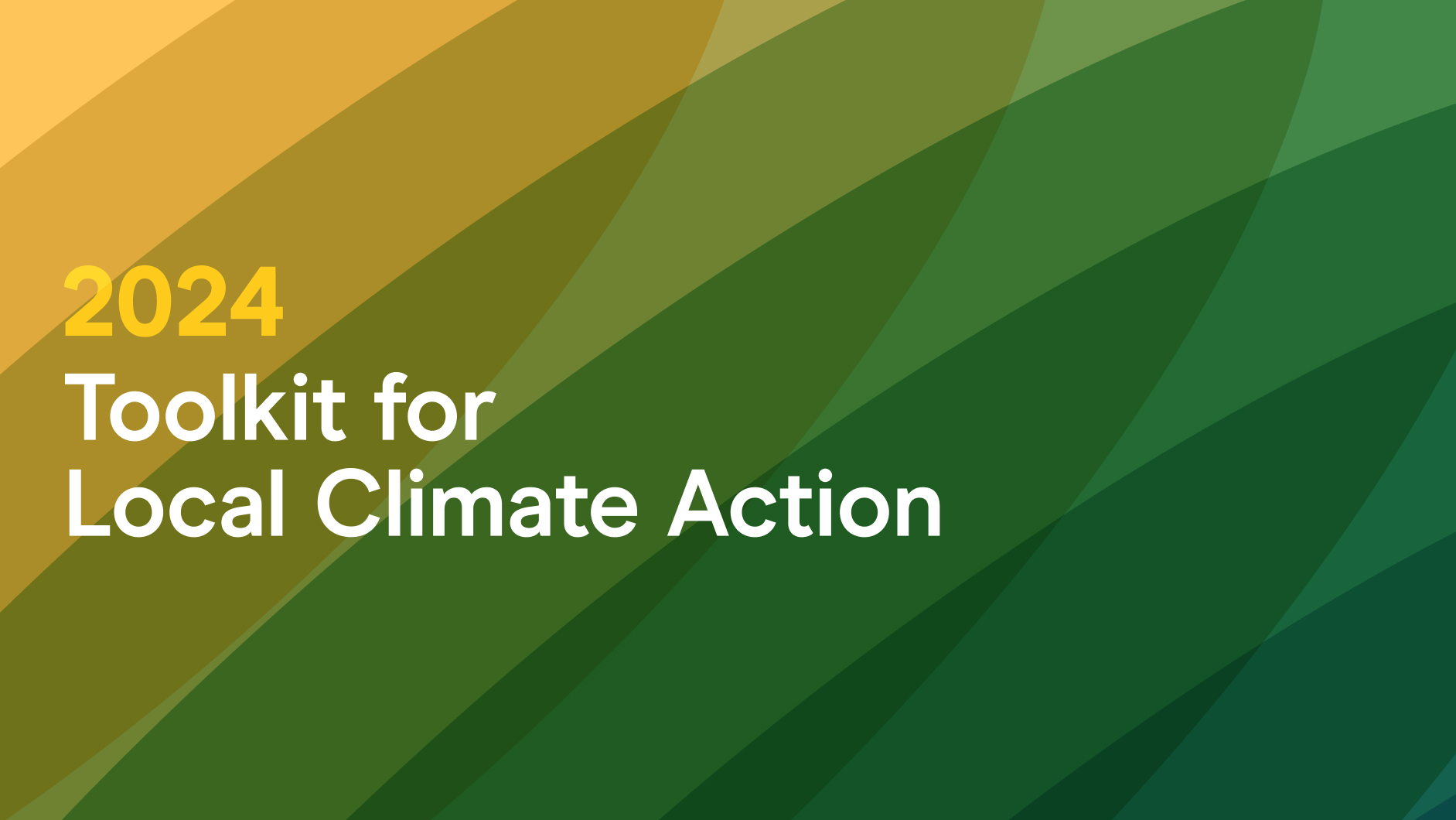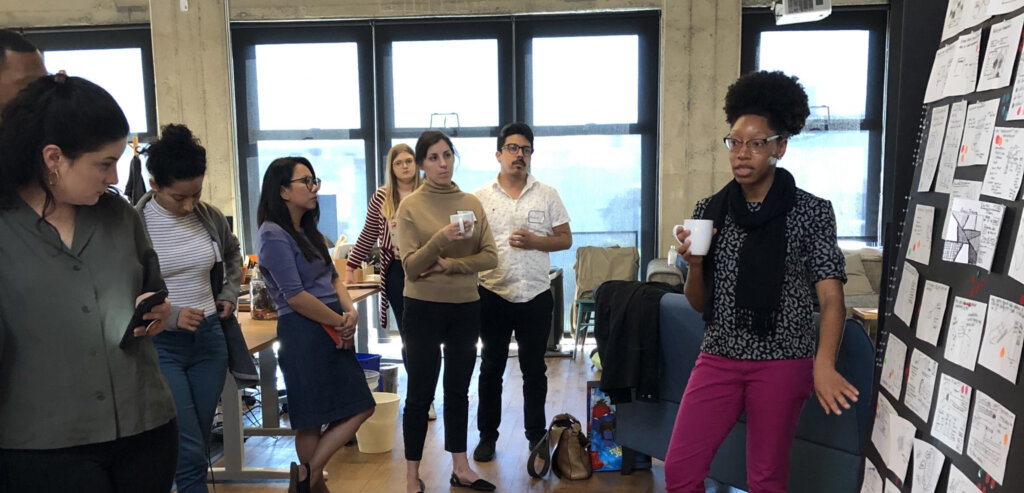
Whether it’s higher rates of asthma from proximity to highway pollution, unsafe conditions for pedestrians and cyclists, or inadequate investment in public transit service, inequities in infrastructure planning have historically placed the heaviest burdens on the most vulnerable communities, including low-income residents, BIPOC, children, seniors, and people with disabilities.
Today, many transportation planners are starting to change their practices to focus on increasing access to safe, accessible, affordable, and environmentally sustainable transportation options for underserved populations. But while roughly 80% of the 50 largest U.S. cities mention “equity” in their long-range transportation plans, planners still largely lack the tools, lived experiences, and insights to help them achieve their goals.
Remix (Cohort 8) set out to help address that problem by developing a software tool to more quickly discover and understand demographic and income data and how projects will impact different communities. Adding this equity-focused feature to Remix’s suite of city-planning software would allow transportation planners to perform quick equity analyses, make the case for funding and project prioritization in historically disinvested communities, and ultimately increase access to safe, clean, and reliable transportation.
Can we plan better for equity if planning tools are built with equity in mind?
Just as departments of transportation (DOTs) often lack the resources and expertise to address issues around historical inequity, technology developers are also prone to blindspots. To overcome this potential barrier, Elemental Excelerator funded and facilitated a project collaboration between Remix, a group of equity and transportation advocates assembled by the Oakland-based mobility justice non-profit TransForm, and several major DOTs around California. The equity advisors for the project were Tamika L. Butler, Dr. Destiny Thomas and Ndidi Love from Thrivance Group, Hana Creger and Leslie Aguayo from the Greenlining Institute, and Jonathan Pruitt and Veronica Tovar of Catholic Charities Diocese of Stockton.
The result was a feature set of geospatial demographic data within Remix’s new Explore product as well as a powerful project brief by TransForm, Remixing Innovation for Mobility Justice. In addition to giving planners quick access to data insights for transportation and infrastructure decision-making, Explore’s new equity feature, Breakdown Tables, opens a window into the actual lived experiences of people. For example, just because a neighborhood has a bus stop doesn’t mean that everyone has access to that bus stop.
Explore’s equity features give planners something they never had before — the ability to quickly discover inequities laid bare by demographic data analysis. With Breakdown Tables, planners can now rapidly disaggregate data in actionable ways that reflect deeper context, inform responsive outreach plans, and develop a more holistic view of the people and communities impacted by their decisions.
TransForm and the project’s equity advisors also underscored that direct community engagement and relationship building that should come after becoming informed are essential for achieving equitable outcomes.
“Equity work cannot be reduced to mere measurements. Many significant harms, impacts, or needs will only be discovered and illuminated by speaking with the people who are directly affected. Data cannot talk but people can. So once data provides an initial visualization or perceived correlation, further steps point back to the need to talk to the impacted population directly for a complete narrative.” — Jamario Jackson, Senior Community Planner at TransForm, in Remixing Innovation for Mobility Justice
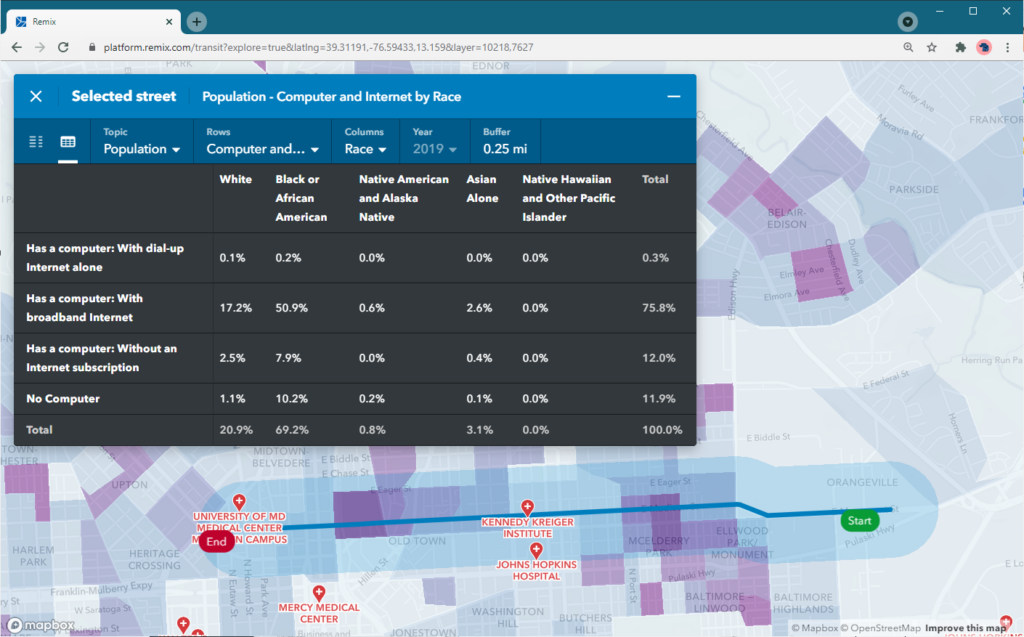
“Remix Explore empowers agencies to scale data-related best practices in mobility justice across their organizations, while giving back the time community engagement requires. This is exactly the role technology should play.” — Rachel Zack, Director of Policy at Remix
Square Partnerships
Elemental’s Square Partnerships model is designed to address the fact that too often the technology design and deployment process omits, sidelines, or delays the voices of people that will be impacted the most. It is built upon our conviction that innovation succeeds best when it engages the community early and often, instead of just funders and customers. It is intended to be a flexible framework for incorporating equity into technology tools and processes so that they can help advance justice-focused innovation and create mutual benefit for partners involved.
What does a square partnership look like in action? In this case, it brings together:
- A tech startup (that’s Remix) collaborating with
- a community organization (TransForm) to co-create a solution for
- customers (Departments of Transportation) with
- Elemental serving as the facilitator of the collaboration
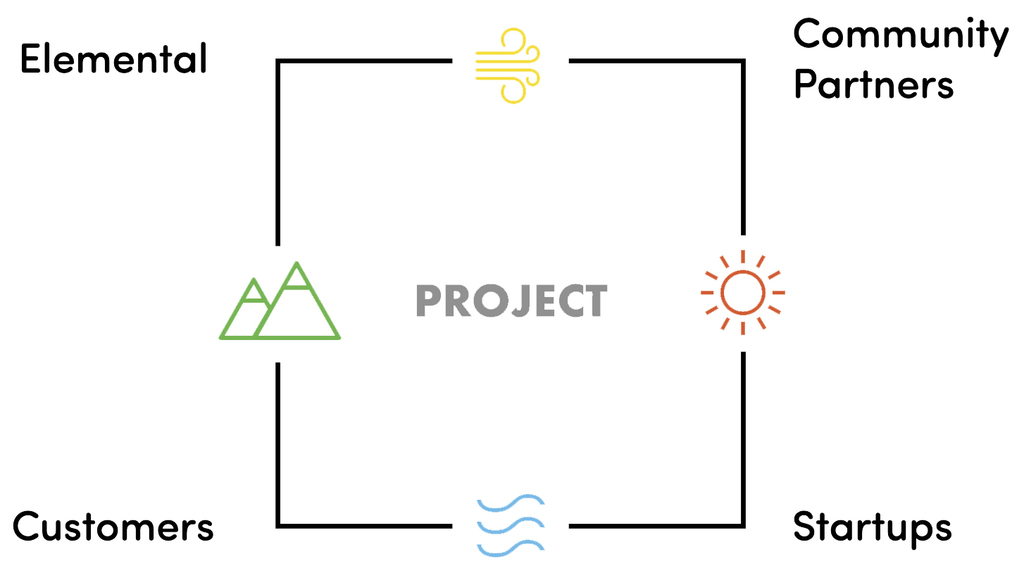
“One thing we wanted to do differently was that too many companies try to shove a solution at a problem without first understanding the needs of the community. You can’t design in a vacuum. You have to start with the question and the problem before you start with the answer and the technology.” — Tiffany Chu, CEO of Remix
Approach
As far back as 2018, Remix had been approached by city customers for solutions around equity analysis for infrastructure. As the Remix team began thinking through how to make the greatest impact with such a feature, they realized that community and advocate input would be critical to address three key questions:
- How can we simplify technical barriers to performing analysis, so that people from the community who might not have a planning background or technical expertise can contribute?
- How can we ensure that this technology enables discoverability, so that planners will encounter critical information they might not have seen outside of the narrow parameters they went in wanting to analyze.
- How can we ensure that this would be contextualized as just one piece of a process that has several best practices that have nothing to do with tech?
With funding and strategic support from Elemental, Remix developed the Explore tool with input from TransForm and equity advocates. As Remix conducted interviews with DOT customers to see how they were thinking about equity, TransForm deployed a survey to 50 different mobility justice, equity, and dignity organizations. The mobility justice non-profit engaged equity advisors to review the prototype and apply it to real problems they were facing in their own work.
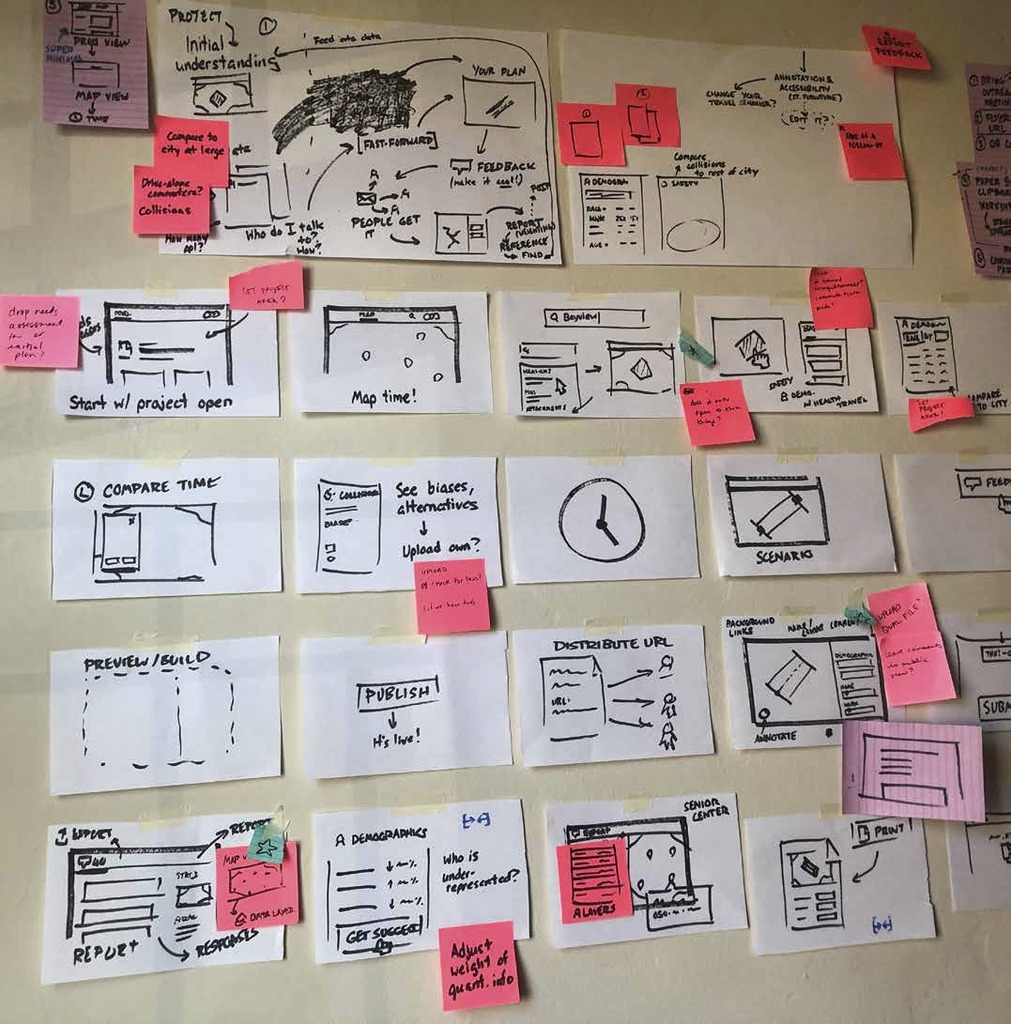
Explore in Action
The equity advisors assembled by TransForm tested the Remix Explore tool across a variety of contexts, highlighting different ways to center planning work around equity. Their eye-opening case studies — around ensuring that a new park can serve low-income earners, making equitable changes to a bus service to serve riders’ needs, and performing an exploration to see if oral histories match data — can be found in Remixing Innovation for Mobility Justice. The report also highlights the fact that technology solutions like Explore are only one component of creating more equitable planning outcomes.
Additional key results for Remix Explore:
- Usage of the equity feature in Explore is up 60% month over month as of March 2021
- Users were able to perform quantitative equity analyses in under an hour, saving up to 20 hours depending on the project scope.
- A large California DOT used Explore to discover that a certain demographic of residents has less internet access, which shaped their community outreach plans around a new project.
- Planners are able to take a more nuanced look at data. For example:
- A transportation planner who learned that there were more commuters before 5AM than he expected. He had been struggling to get enough survey responses to understand commuting patterns in the area. This makes him consider adding earlier service.
- Another planner noticed a huge disparity in women who drive alone versus men in the project area: 66% versus 75%.
- Another planner was wowed by some of the stats on occupancy and rent percentage of income, and felt like this discovery would help her identify which other departments she should coordinate with on the project.
Takeaways
“What makes our cities truly beautiful is the fact that they’re all different, you can’t copy and paste anything within a city. And that’s what makes planners more artists in my eyes than anything else. The Remix Explore tool is extremely revolutionary in its ability to scale equity efforts within transportation infrastructure across the nation with Remix’s 350-plus city customers.” — Danielle J. Harris, Elemental’s Director of Mobility Innovation
“Equity as a concept in the tech community is too much focused on just hiring and inclusion and making sure you have a VP of DEI sitting at some level in your executive circle. I think the unique opportunity with this project with Elemental was to actually make sure equity was built into our product in a way that ultimately benefited the end user, which are our city planners and our communities.” — Tiffany Chu, CEO of Remix
“We like working with companies like Remix because it really starts to change the balance of power in America when private companies think about serving the larger purpose of equity. The whole notion of equity is to actually deal with what’s on the ground and to address those stakeholders and their concerns directly. These new technologies can be very helpful for that. And by working with community organizations to find where the issues are, they can find a whole untapped market that has not been addressed yet.” — Darnell Grisby, Executive Director of TransForm
We’d like to extend special thanks and gratitude for everyone involved in this project, including:
Equity Advisors
Tamika L. Butler, Principal + Founder, Tamika L. Butler Consulting
Dr. Destiny Thomas, Founder and CEO, Thrivance Group
Ndidi Love, Thrivance Group
Hana Cregar & Leslie Aguayo, Environmental Equity Program Managers, The Greenlining Institute
Veronica Tovar, formerly of Catholic Charities of the Diocese of Stockton
Jonathan Pruitt, Environmental Justice Program Coordinator, Catholic Charities of the Diocese of Stockton
TransForm Team
Jamario Jackson, Senior Community Planner
Clarrissa Cabansagan, Director of Programs
Edie Irons, Communications Director
Hayley Currier, Policy Advocacy Manager
Darnell Grisby, Executive Director
Remix Team
Rachel Zack, Director of Policy
Caitlin Hewitt, Explore Product Manager
Rebekah Watkins, Manager of Data Visualization
Tiffany Chu, Founder and CEO




